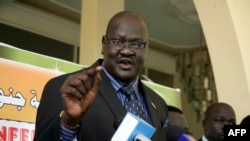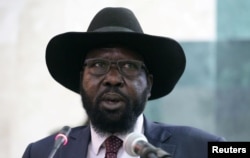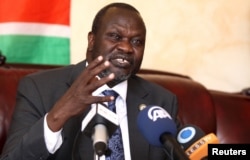Efforts to start a "national dialogue" in war-ravaged South Sudan are on hold again after a key steering committee could not muster enough members for a quorum.
The government says more than half the committee members appointed by President Salva Kiir have yet to report for duty.
Presidential spokesman Ateny Wek Ateny said Sunday that officials were forced to delay the swearing-in of the committee that was to oversee the dialogue.
"It has been postponed until further notice because the percentage of the steering committee was only 20 percent. So we are waiting [for] committee members at least to be 50-plus [percent] before they are sworn in," Ateny said.
Kiir said in December that the national dialogue would begin sometime in early March, but some observers now doubt whether the long-awaited discussions will start at all.
Ateny said last month that financial and technical challenges prevented the swearing-in of the committee charged with steering the dialogue.
Activist says trust needed
Civil society activist Rajab Muhandis said the government has been inconsistent in its effort to get the dialogue off the ground ever since Kiir announced the initiative. He said the delays weaken the initiative and lead citizens to lose hope in the government's ability to end South Sudan's three-and-half-year conflict.
Muhandis, who heads the South Sudanese Network for Democracy and Elections, said the indefinite suspension occurred because the steering committee is too large.
He said the government must have a clear channel of communication to build trust among the people that the dialogue will take place and make a difference.
"Putting together a robust committee that is sizable enough to run the process effectively will give people a sign of hope. And the committee should talk to people that the nation is moving toward a national dialogue. Now we only talk about forming a committee," Muhandis told VOA's South Sudan in Focus.
He said the government needs to engage other parties, including all warring parties, adding "it is the only way to make the dialogue genuine."
The government has been fighting rebels led by former Vice President Riek Machar since December 2013. Other rebel groups have recently emerged as the country struggles with food shortages and a humanitarian crisis that has displaced more than two million people.
Call for Kiir to step down
Meanwhile, a prominent retired South Sudanese Anglican clergyman has called on President Kiir to step down.
Reverend Canon Clement Janda was recently asked by Kiir to sit on the dialogue's steering committee, but he declined the offer, saying the process is not inclusive.
"If I knew it was a genuine process, that the people could dialogue in order to bring peace to South Sudan, I would not hesitate," Janda said.
Janda calls the national dialogue a "monologue," adding it has "not changed in substance."
"Only when they are ready to sit together with those that they disagree [with], then we begin to see light at the end of the tunnel," Janda said.








